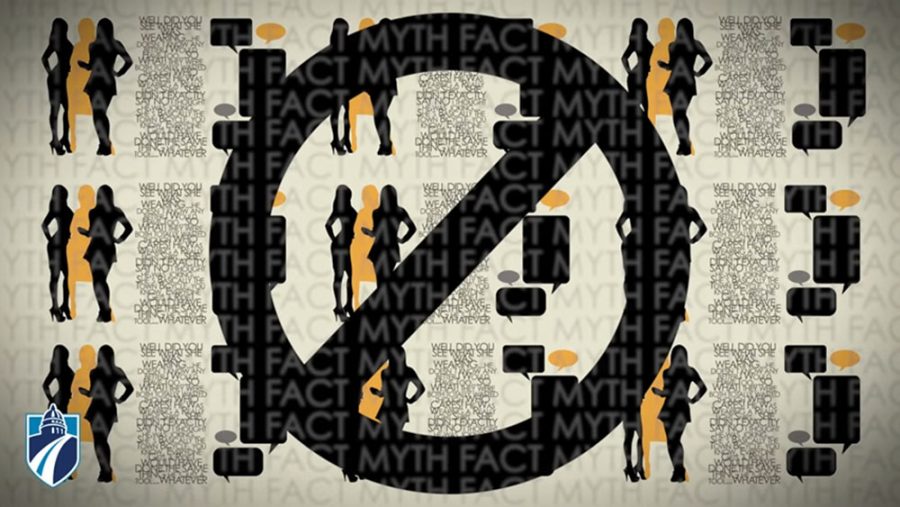A survivor’s perspective
A screen shot shows one of the slides from the “Take a Stand: Stop Sexual Violence Prevention Training” video series.
On Monday, Oct. 1, students at Madison College received a mass email from the Dean of Students with the subject line “Take a Stand: Stop Sexual Violence Prevention Training.” Brett Kavanaugh and Dr. Christine Blasey Ford had testified just a few days earlier, on Sept. 27, before the Senate Judiciary Committee, and like so many women, I’d spent the following days secret-crying and dissociating my way through the world. The details of Ford’s testimony and the disappointing reactions of Washington’s Good Ol’ Boys Club had made my old wounds fresh, and the online outpouring of stories from friends, hashtagged “WhyIDidn’tReport,” was devastating.
So, when I got that email from the Dean of Students, letting me know I was “required to complete this online prevention program,” I was exhausted at the thought of it. “Exhausting” is the primary way I’d characterize being a survivor of sexual assault for me now, years after the fact.
The thing is, the complex trauma of being raped isn’t limited to the assault itself.
It’s a procession of indignities: the disappointing reactions of mutual friends who insist that it must have been a misunderstanding, their resentment of you for complicating their friendships, the pelvic exam, the retelling of your story to healthcare providers and school administrators and family, obtaining the medical records from your gynecologist, disclosing those intimate records to your school so that they’ll allow you to forfeit your paid tuition dollars and take a medical withdrawal for the semester because hyperventilating while you explain that you were raped and can’t seem to get out of bed or concentrate isn’t enough to “prove it.”
And because the exchanging of rape stories is basically an induction ceremony ritual in female friendships, the retelling never stops. Like I said, it’s exhausting.
If you, too, are a survivor of sexual assault, get ready to be emotionally drained watching these mandated corporate-training-style videos about rape! Madison College has served up a buffet of triggering content for you in the form of 10 short videos that run the gamut from awkward cue-card reading of legalese to the suggestion that one can circumvent rape by saying, “Not cool, bro.”
One video opens with the sound of a murmuring crowd, and phrases used to minimize sexual assault start popping onto the screen, overlapping, in a typeface I can only describe as gothic comic sans. These phrases include the evergreen “she was asking for it” and “I heard she likes it rough.” Yikes!
I don’t want to make this entire project sound like a garbage fire because some of these videos are wonderful, particularly Video 6: Myths and Facts: A Rape Prone Culture. I’m truly glad that Madison College is attempting to educate its students about rape culture and dispel some of the myths that let so many people (but mostly men) live their lives never knowing they’re somebody’s rapist.
But the thing is, immediately following that one excellent video, there’s another called Personal Empowerment giving you hot tips like, “If you drink, drink responsibly. Eat a full meal before going out. Have a glass of water between each drink.” The video is chock-full of advice that puts the onus right back on women to prevent their own rapes. And you know what I say to that? Not cool, bro.
At this point, you may be getting ready to put me on blast for not yet mentioning that men, as well as trans and non-gendered people, also experience sexual assault. But that leads me to something this series did right — just as I was getting ready to slam them for focusing exclusively
on female victims, Blanca De Leon addresses that issue and drops this truth bomb in Video 4: “We can’t ignore the statistics that women experience 96% of the sexual violence in our society.” She goes on to acknowledge that sexual assault happens to people of all races and genders, and she includes trans and non-gendered people. So, way to not further marginalize the most vulnerable people in our society, Madison College!
Overall, there were moments in this series that made me genuinely hopeful that perhaps some potential rapist might be educated out of ruining someone’s life. For example, the third video gives this incredibly comprehensive definition of consent: “If a person is mentally or physically incapacitated or impaired to the extent that they cannot understand the sexual situation, there is no consent. This includes impairment due to alcohol or drug consumption, or being asleep or unconscious. Most of the time, we think of consent in the negative. For example, she didn’t say no or scream or punch or kick. It is important to understand that consent is about saying yes much more than it is about not hearing no.”
If you’ve experienced assault and don’t feel like having your day/week/ month ruined with a PTSD moment, I strongly suggest skipping these videos and heading straight for the quiz. To the Dean of Students, Title IX Coordinator, and everyone who labored on this video series: Sorry if I seem ungrateful for what was clearly a huge project taken on with the best of intentions.
It’s just that right now I am so, so tired.


























